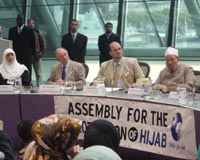The proposed French law banning Islamic headscarves and other visible religious symbols in state schools would violate the rights to freedom of religion and expression, Human Rights Watch said today. The law, which forbids “signs and dress that conspicuously show the religious affiliation of students,” will be debated in the French Senate on March 2.
“The proposed law is an unwarranted infringement on the right to religious practice,” said Kenneth Roth, executive director of Human Rights Watch. “For many Muslims, wearing a headscarf is not only about religious expression, it is about religious obligation.”
International human rights law obliges state authorities to avoid coercion in matters of religious freedom, and this obligation must be taken into account when devising school dress codes. The proposed prohibition on headscarves in France, as with laws in some Muslim countries that force girls to wear headscarves in schools, violates this principle.
Under international law, states can only limit religious practices when there is a compelling public safety reason, when the manifestation of religious beliefs would impinge on the rights of others, or when it serves a legitimate educational function (such as prohibiting practices that preclude student-teacher interaction). Muslim headscarves, Sikh turbans, Jewish skullcaps and large Christian crosses – which are among the visible religious symbols that would be prohibited – do not pose a threat to public health, order or morals; they have no effect on the fundamental rights and freedoms of other students; and they do not undermine a school’s educational function.
Some supporters of the proposed law – known as the “Draft law concerning the application of the principle of secularism in schools, junior high schools and high schools,” which would come into force in September – believe it is necessary to uphold the separation of church and state in education, and to protect the secular state from the perceived threat of religious fundamentalism, particularly Islamic fundamentalism.
However, protecting the right of all students to religious freedom does not undermine secularism in schools. On the contrary, it demonstrates respect for religious diversity, a position fully consistent with maintaining the strict separation of public institutions from any particular religious message. Human Rights Watch recognizes the legitimacy of public institutions seeking not to promote any religion via their conduct or statements, but the French government has taken this a step further by suggesting that the state is undermining secularism if it allows students to wear religious symbols.
Human Rights News, 27 February 2004
See also Islam Online 27 February 2004
 The pro-hijab conference held Monday, July 12, at the Greater London Authority, announced an international hijab solidarity day and an action plan to defend the right of Muslim women to take on the headscarf.
The pro-hijab conference held Monday, July 12, at the Greater London Authority, announced an international hijab solidarity day and an action plan to defend the right of Muslim women to take on the headscarf.